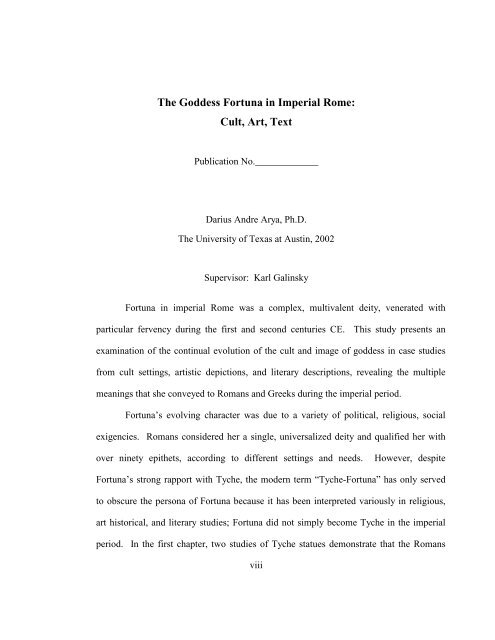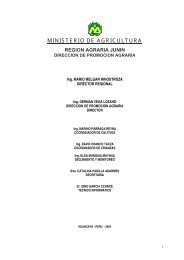- Page 1 and 2: Copyright by Darius Andre Arya 2002
- Page 3 and 4: The Goddess Fortuna in Imperial Rom
- Page 5 and 6: Acknowledgements This study of Fort
- Page 7: the moment I arrived in Texas, this
- Page 11 and 12: Fortuna: multivalent (beneficent an
- Page 13 and 14: Fortuna “installations” in the
- Page 15 and 16: The Antonines and Severans ........
- Page 17 and 18: unique creation from Sparta, which
- Page 19 and 20: slightly to the viewer’s left; th
- Page 21 and 22: The mural crown of Tyche was derive
- Page 23 and 24: Vergil’s Aeneid (6.626-670), whic
- Page 25 and 26: shoulders his father, Anchises (who
- Page 27 and 28: mural crown itself. Two gates are o
- Page 29 and 30: The Sparta Tyche head, with the fig
- Page 31 and 32: By virtue of the depiction of the w
- Page 33 and 34: of Augustus. 51 The emperor also cr
- Page 35 and 36: agora analogous to the Tyche statue
- Page 37 and 38: The basic information about the sta
- Page 39 and 40: figured prominently in other Seleuc
- Page 41 and 42: vicinity of the Theater of Marcellu
- Page 43 and 44: ecame visually canonized through he
- Page 45 and 46: Most scholars, instead, identify th
- Page 47 and 48: coinage in the East. The city becam
- Page 49 and 50: triad. 103 The Tyche of Antioch sea
- Page 51 and 52: emperor. The first Tyche statue con
- Page 53 and 54: fortune of a city, and the fortune
- Page 55 and 56: eginnings. Ferre, “to bring,” a
- Page 57 and 58: SCOPE OF THE STUDY Recent studies o
- Page 59 and 60:
as many scholars often conclude. 13
- Page 61 and 62:
characteristics of Tyche has obscur
- Page 63 and 64:
goddess was a central feature in th
- Page 65 and 66:
Initial inquiries into the relation
- Page 67 and 68:
Chapter 2: The interrelationship be
- Page 69 and 70:
Fortuna” does not necessarily des
- Page 71 and 72:
conquered one’s own city). 154 Th
- Page 73 and 74:
Fortuna: multivalent (beneficent an
- Page 75 and 76:
Respiciens (Cicero, leg., 2.28), an
- Page 77 and 78:
cases, the two Fortuna goddesses ar
- Page 79 and 80:
adorned the bronze 178 cult statue
- Page 81 and 82:
econstruction of the entire site at
- Page 83 and 84:
Max. 1.8.11, Ovid, Fasti, 6.569-572
- Page 85 and 86:
Cornucopia The account of one of th
- Page 87 and 88:
chthonic deities. 213 By the first
- Page 89 and 90:
grain, e.g., the Tychai of Alexandr
- Page 91 and 92:
fourth century depict the goddess w
- Page 93 and 94:
the relief, has questioned the iden
- Page 95 and 96:
an independent symbol of power. 252
- Page 97 and 98:
The concept of Tyche standing preca
- Page 99 and 100:
statuary depicting Fortuna holding
- Page 101 and 102:
an apple tree branch in her left ha
- Page 103 and 104:
The wheel, in a negative sense, as
- Page 105 and 106:
Tyche in the sixth century BCE rema
- Page 107 and 108:
securely-identified Fortuna-type fi
- Page 109 and 110:
a term; indeed, the Romans never de
- Page 111 and 112:
artistic representations (discussed
- Page 113 and 114:
In particular, the Tabula of Cebes,
- Page 115 and 116:
Hellenistic depictions of Tyche, ac
- Page 117 and 118:
Writing in Greek, Plutarch defines
- Page 119 and 120:
two essays on Alexander served as a
- Page 121 and 122:
“ἤόόὶάὶίίίὴ
- Page 123 and 124:
depended on its dedicator, the circ
- Page 125 and 126:
disagreements on Plutarch’s trans
- Page 127 and 128:
features common to her artistic rep
- Page 129 and 130:
stormy sea crossing (319B-D). This
- Page 131 and 132:
individuals. 355 In Plutarch’s hi
- Page 133 and 134:
Arete-Tyche topos Plutarch’s essa
- Page 135 and 136:
Historians also recognized Tyche’
- Page 137 and 138:
In On the Fortune of the Romans, Pl
- Page 139 and 140:
protecting Rome throughout history
- Page 141 and 142:
Plutarch reveals that the reigns of
- Page 143 and 144:
the East as early as the second cen
- Page 145 and 146:
honor gods, speak to and for cities
- Page 147 and 148:
the demise of Greek power and the r
- Page 149 and 150:
defeats of Philip V and Antiochus I
- Page 151 and 152:
Fortune of the Romans, however, dem
- Page 153 and 154:
Chapter 3: Fortuna and the late Rep
- Page 155 and 156:
throne, another, naked, holding a g
- Page 157 and 158:
of the period immediately after the
- Page 159 and 160:
including Stoicism. Indeed, the Tyc
- Page 161 and 162:
individual identified as such. 439
- Page 163 and 164:
The Greek city states and citizens
- Page 165 and 166:
great influence in Caesarian and Au
- Page 167 and 168:
events that took place in the fifth
- Page 169 and 170:
Roman deities, 474 became less the
- Page 171 and 172:
Personal relations with Fortuna in
- Page 173 and 174:
Primigenia, Antium, and the Tyche o
- Page 175 and 176:
epiphany of the god, akin to appear
- Page 177 and 178:
goddess, successfully blended with
- Page 179 and 180:
(8.26.3). Both Greek terms underlin
- Page 181 and 182:
uncertain deity and ensurer of vict
- Page 183 and 184:
architectural complex, in particula
- Page 185 and 186:
had just been rebuilt recently, was
- Page 187 and 188:
of the round temple and long portic
- Page 189 and 190:
associative iconography of the Roma
- Page 191 and 192:
Pythagorean doctrines, which flouri
- Page 193 and 194:
to Dem, 153, 474). Triptolemus was
- Page 195 and 196:
and Augustus. 575 The Temple of For
- Page 197 and 198:
Sulla, 34.3). He designated Lucullu
- Page 199 and 200:
mural crown). 586 The affinity betw
- Page 201 and 202:
Sulla also fostered personal relati
- Page 203 and 204:
constructed a massive temple dedica
- Page 205 and 206:
essentially muscled in on Lucullus
- Page 207 and 208:
archaeological remains justify Coar
- Page 209 and 210:
Capitoline), thereby demonstrating
- Page 211 and 212:
the Augustan building program, in t
- Page 213 and 214:
This new attribution of the Fortuna
- Page 215 and 216:
symbolic ramifications. 639 Not onl
- Page 217 and 218:
his household in 12 CE to the shrin
- Page 219 and 220:
creation of the cult of divus Iuliu
- Page 221 and 222:
BCE. Indeed, recent study suggests
- Page 223 and 224:
tyche. 665 The association between
- Page 225 and 226:
Through his subsequent dedication o
- Page 227 and 228:
pietas, reflects Lucius’ fraterna
- Page 229 and 230:
Valeria and Sulla and to the Graeco
- Page 231 and 232:
In conclusion, the Late Republican
- Page 233 and 234:
of Hellenistic Alexandria, created
- Page 235 and 236:
According to the new study, the ter
- Page 237 and 238:
the sea with a fisherman’s vessel
- Page 239 and 240:
generals, that Victory and Good For
- Page 241 and 242:
eligio-political Augustan program i
- Page 243 and 244:
audience and context. As a result o
- Page 245 and 246:
With the victory of Octavian over M
- Page 247 and 248:
the fact that the entrances faced o
- Page 249 and 250:
entrance into Augustus’ Mausoleum
- Page 251 and 252:
studies, Caesar’s role in these p
- Page 253 and 254:
Agrippa, 741 would actually succeed
- Page 255 and 256:
libraries. In doing so, Caesar join
- Page 257 and 258:
Nile, a common feature of Isiac san
- Page 259 and 260:
echoed in the creation of the Tycha
- Page 261 and 262:
the Italian Fortuna cult by the end
- Page 263 and 264:
The planning (and possible construc
- Page 265 and 266:
The Augustan Campus Martius related
- Page 267 and 268:
and the sentiments of victory that
- Page 269 and 270:
The earliest mention of the water b
- Page 271 and 272:
dedicated on September 23, Augustus
- Page 273 and 274:
Apollo from nearby Seleucia; Apollo
- Page 275 and 276:
Chapter 5: Fortuna in Augustan Rome
- Page 277 and 278:
of dynastic succession, for the Jul
- Page 279 and 280:
complexity of these cults in Rome.
- Page 281 and 282:
two stanzas of I.35, Nisbet and Hub
- Page 283 and 284:
Fortuna as other deities of Rome, a
- Page 285 and 286:
asking Fortuna to protect Augustus,
- Page 287 and 288:
Rome (both of which utilized Antium
- Page 289 and 290:
with an actual prayer to the goddes
- Page 291 and 292:
Through her many epithets (90), 855
- Page 293 and 294:
In the second century CE, the priva
- Page 295 and 296:
predominant, private and public shr
- Page 297 and 298:
Aurelius Urbanus/ ex voto” next t
- Page 299 and 300:
well as goddess who could turn arou
- Page 301 and 302:
FORTUNA IN THE MARS ULTOR PEDIMENT
- Page 303 and 304:
The pairing of Fortuna and Venus in
- Page 305 and 306:
Lucan's choice of the mural crown f
- Page 307 and 308:
lituus, in the Mars Ultor panel as
- Page 309 and 310:
[Aram Fortunam Reducis ante ae]des
- Page 311 and 312:
Historical background: grain shorta
- Page 313 and 314:
The altar in relationship to nearby
- Page 315 and 316:
identified with the Muses and assoc
- Page 317 and 318:
the structure where the general cha
- Page 319 and 320:
he later celebrated this diplomatic
- Page 321 and 322:
to Parthia, Trajan stopped at Antio
- Page 323 and 324:
archaeological park of S. Omobono.
- Page 325 and 326:
i.e., without figural panels. 965 G
- Page 327 and 328:
of the altar, December 15 (Degrassi
- Page 329 and 330:
Apollo were paired in cult settings
- Page 331 and 332:
theme of Fortuna’s role in time,
- Page 333 and 334:
general. 984 Although the literary
- Page 335 and 336:
presents the double gate next to th
- Page 337 and 338:
Nova. 997 However, he flatly reject
- Page 339 and 340:
the “gate” (a triumphal arch ac
- Page 341 and 342:
esponse to the famine that was reco
- Page 343 and 344:
the early fifth century CE. 1022 De
- Page 345 and 346:
studies. 1027 The Marcus Aurelius
- Page 347 and 348:
elief, the relief has been dated to
- Page 349 and 350:
Nortia and Nemesis, were aspects th
- Page 351 and 352:
vengeance on imperial monuments, su
- Page 353 and 354:
second and third centuries CE, and
- Page 355 and 356:
administered by slaves (see below).
- Page 357 and 358:
later, they were both slaves and fr
- Page 359 and 360:
Fortuna Augusta are common in the A
- Page 361 and 362:
The association between non-elites
- Page 363 and 364:
society and was readily adopted by
- Page 365 and 366:
The inscriptional evidence for the
- Page 367 and 368:
demonstrates that the city became a
- Page 369 and 370:
society. The dialogue that began ce
- Page 371 and 372:
of plenty capped with a twin of Dru
- Page 373 and 374:
Sejanus and Galba represent two ind
- Page 375 and 376:
officially joined Fortuna Redux as
- Page 377 and 378:
The rise of the Flavians signaled a
- Page 379 and 380:
Hadrian, reminiscent of the scene f
- Page 381 and 382:
Many other episodes demonstrate the
- Page 383 and 384:
the cultural setting of Rome, accor
- Page 385 and 386:
Bibliography Abramenko, A. (1993).
- Page 387 and 388:
Bemmann, K. (1992). Füllhörner in
- Page 389 and 390:
Cahn, H. A. (1981). "Abundantia," L
- Page 391 and 392:
_________. (1993). Lazio, (Guide Ar
- Page 393 and 394:
Dohrn, T. (1960). Die Tyche von Ant
- Page 395 and 396:
Forni, G. (1989). La Fortuna dei Ro
- Page 397 and 398:
Gersht, R. (1984). "The Tyche of Ca
- Page 399 and 400:
Hallett, C. H. (1995). “Kopienkri
- Page 401 and 402:
Hornum, M. B. (1993). Nemesis, The
- Page 403 and 404:
Koeppel, G. (1983). “Die historis
- Page 405 and 406:
Levi, M. A. (1980). “’Fortuna-f
- Page 407 and 408:
Martin, H. G. (1987). Römische Tem
- Page 409 and 410:
Naumann, F. (1983). Der Ikonographi
- Page 411 and 412:
Perry, B. E. (1967). The Ancient Ro
- Page 413 and 414:
________. (1994). “Caesar: civil
- Page 415 and 416:
________. (1992). “Der Capricorn
- Page 417 and 418:
____________. (2000). “Nero and t
- Page 419 and 420:
Tobin, J. (1993). "Some new thought
- Page 421 and 422:
Viscogliosi, A. (1996). “Il tempi
- Page 423 and 424:
Zanker, P. (1984) Il Foro di August
















